June 5, 2025 | 10:27 GMT +7
June 5, 2025 | 10:27 GMT +7
Hotline: 0913.378.918
June 5, 2025 | 10:27 GMT +7
Hotline: 0913.378.918
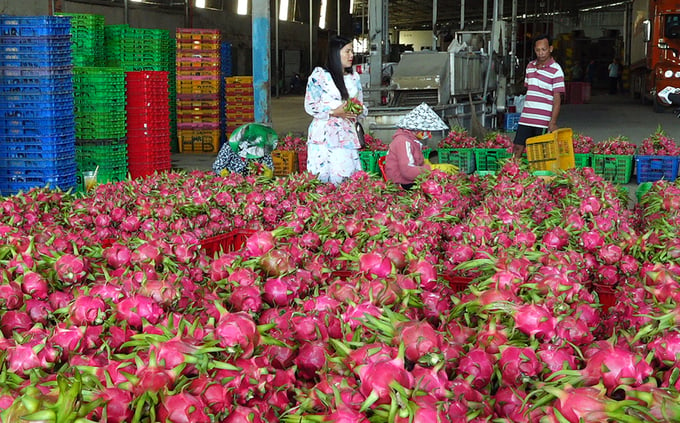
Currently, Binh Thuan dragon fruit is exported to 20 countries around the world. Photo: KS.
Mr. Huynh Canh, Chairman of the Binh Thuan Dragon Fruit Association, reported that during the first nine months of this year, the export of dragon fruit from the province has been both favorable and stable in various international markets. As of now, Binh Thuan dragon fruit is being exported to 20 countries worldwide.
Mr. Canh noted that exports are not limited to China; there is a notable shift toward other markets, including India, Thailand, South Korea, Japan, Australia, and Russia. This diversification has contributed to maintaining the price of dragon fruit at a high and stable level, averaging around 0.63 USD/kg. At this price point, farmers are enjoying profits of around 30-40%.
However, in recent days, the price of dragon fruit has started to decline to about 0.51 USD/kg due to an increase in production and slower demand from the Chinese market. Conversely, for dragon fruit that meets GlobalGAP standards, prices remain significantly higher, at over 0.85 USD/kg for white flesh and 1.27 USD/kg for red flesh. This stability is largely due to fixed contracts lasting for one year, which helps farmers avoid the common issue of "high yields but low prices".
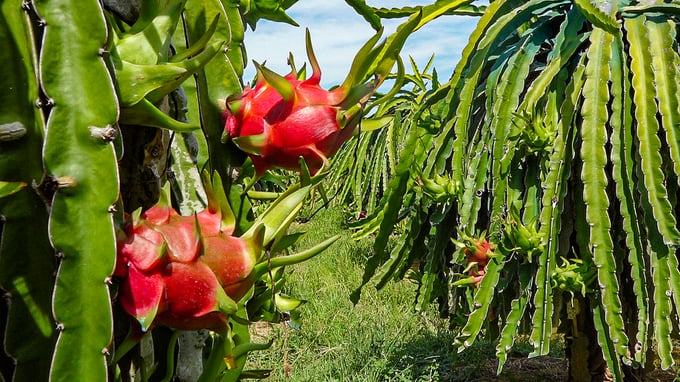
Recently, the price of Binh Thuan dragon fruit has been purchased at a stable rate. Photo: KS.
Mr. Bien Tan Tai, the Deputy Director of the Binh Thuan Department of Industry and Trade, reported that during the first nine months of 2024, the official export turnover of dragon fruit from the province is projected to reach approximately 6.4 million USD. This figure is equivalent to around 5.340 tons of fresh dragon fruit, reflecting a growth of 2.3% in value and 9.4% in volume compared to the same period last year. The primary export markets for Binh Thuan dragon fruit are concentrated in several countries, including China, Australia, Thailand, Hong Kong, South Korea, and Russia.
In terms of unofficial exports, Mr. Tai mentioned that during the same timeframe, about 600.000 tons of dragon fruit were exported through the northern border gates. A significant portion of this volume consists of dragon fruit from Binh Thuan.
According to Mr. Bien Tan Tai, the demand for dragon fruit is expected to increase in the final months of the year, particularly in key export markets such as China, Hong Kong, South Korea, and Australia. The upcoming holiday season, including Christmas and the New Year celebrations in these countries, is likely to boost exports of this product.
However, he cautioned that the increase in demand may not be substantial. The supply of dragon fruit in China remains quite abundant. Additionally, markets like Hong Kong, South Korea, and Australia currently hold a relatively small share of the overall demand.
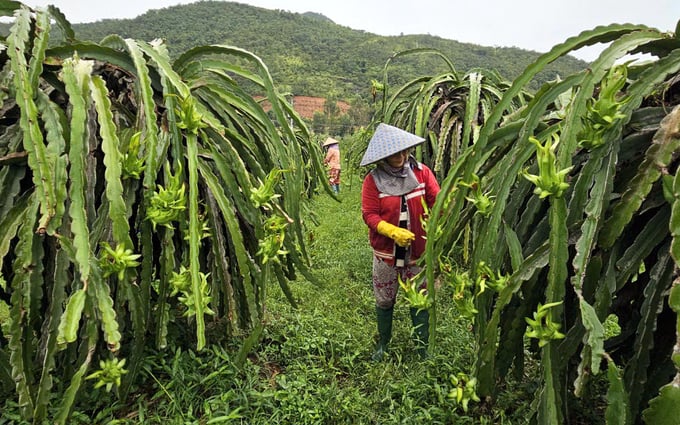
Farmers in Binh Thuan are tending to dragon fruit. Photo: KS.
The Deputy Director of the Binh Thuan Department of Industry and Trade further emphasized that despite the substantial global demand for dragon fruit, meeting the requirements of the export market entails several critical factors beyond simply offering visually appealing products. Consumers in various countries are increasingly focused on food safety and hygiene standards. As such, it is essential for farmers to prioritize the establishment of regional cultivation codes and to adopt clean production practices that adhere to VietGAP and GlobalGAP standards. This focus not only enhances product quality but also aligns with the stringent regulations and requirements set forth by importing countries.
Moreover, enterprises involved in dragon fruit cultivation must prioritize the research and application of high-tech solutions in the areas of preservation and processing. Investing in advanced, modern, and integrated technology and equipment is vital for improving production efficiency and product quality. Additionally, diversifying processed products and enhancing deep processing capabilities will be instrumental in increasing competitiveness in the market.
Encouraging businesses to invest in collaborative partnerships with farmers throughout the value chain is of utmost importance. These businesses should develop proactive plans to adjust production in alignment with market demands. Additionally, it is crucial to maintain stringent oversight regarding the use of chemicals, growth stimulants, and weight-enhancing agents throughout the entire dragon fruit production and distribution process. This level of control is necessary to satisfy the varying requirements of different markets.
For companies involved in exports through border trade, it is vital to keep abreast of the customs clearance processes at the northern border gates. Regular updates on these developments will enable businesses to effectively strategize their production, packaging, delivery, and export logistics. This proactive stance will help mitigate the risk of congestion and other adverse effects, particularly as the Lunar New Year approaches, a period known for heightened demand.
According to the Binh Thuan Department of Agriculture and Rural Development, the province currently boasts over 24.000 hectares dedicated to dragon fruit cultivation, primarily consisting of the white flesh variety. Among this total, approximately 8.500 hectares are produced under VietGAP standards, with a target set by the agricultural sector to expand this to 10.500 hectares by the end of 2024. Furthermore, the province is home to around 400 hectares of dragon fruit cultivated according to GlobalGAP standards and an additional 30 hectares of organic dragon fruit.
Translated by Phuong Linh

(VAN) Vietnam's pepper industry is looking forward to the final tariff decision in order to sustain its robust presence in the United States, the country's biggest pepper market.

(VAN) The U.S. is the largest market for Vietnamese cashew nuts. However, when exports to the U.S. encounter difficulties due to reciprocal tariffs, Vietnamese cashews still have many other potential markets.

(VAN) Reciprocal tariffs present a significant obstacle to Vietnam's wood exports to the United States; however, domestic wood businesses are endeavoring to preserve their market share in this critical market.

(VAN) Businesses in Vietnam are attempting to export rice to the United States ahead of the implementation of reciprocal tariffs, while remaining their optimism regarding this critical market.
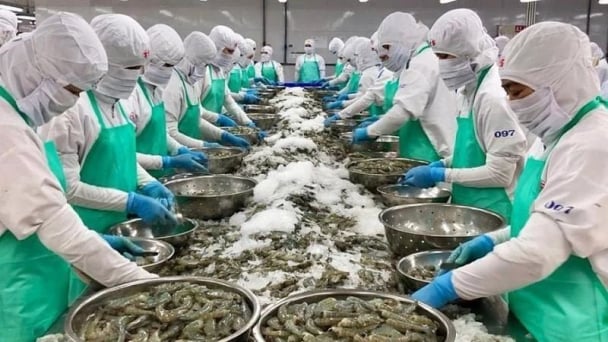
(VAN) From containers of cashew nuts, shrimp to in-depth technical dialogues, agricultural cooperation between Vietnam and the United States is entering a period of sustainable and two-way development.
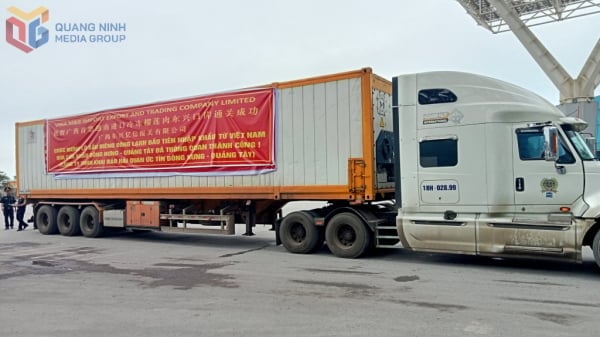
(VAN) After the talks on May 28, Vietnam successfully exported its first batch of frozen durians to China, marking a new milestone in agricultural trade cooperation between the two countries.
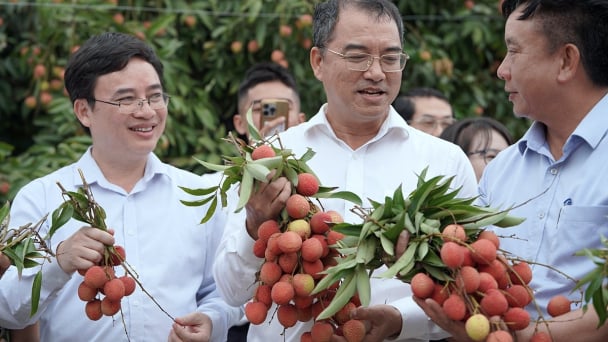
(VAN) Several major companies, such as Red Dragon and Ameii Vietnam, have signed purchasing agreements for the 2025 season, targeting markets including Japan, the United States, and the EU.